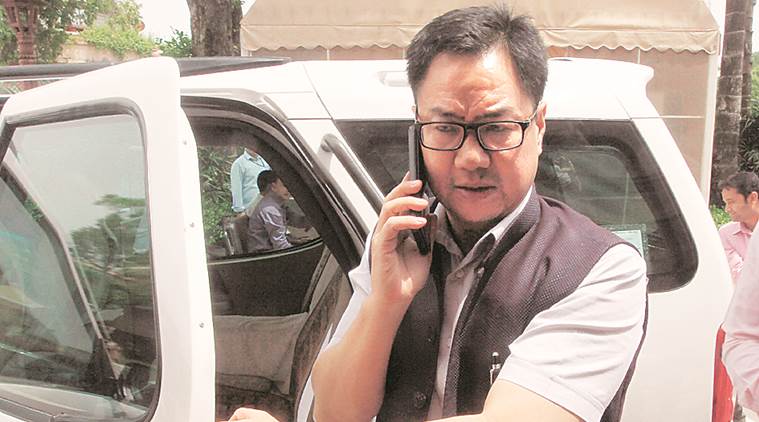 MoS (Home) Kiren Rijiju in Parliament on Monday: Law aimed at providing safety to minor girls. Prem Nath Pandey
MoS (Home) Kiren Rijiju in Parliament on Monday: Law aimed at providing safety to minor girls. Prem Nath Pandey
Three months after the Union Cabinet approved the ordinance, the Lok Sabha on Monday passed a Bill that provides for death penalty for those convicted of raping girls below the age of 12 years, taking a step closer to making this the law. The Bill replaces the Criminal Law (Amendment) Ordinance promulgated on April 21, following outcry over the gangrape and murder of a girl in Kathua, in Jammu and Kashmir, and the rape of another woman in Unnao, Uttar Pradesh.
Although the Criminal Law (Amendment) Bill 2018 was supported by most members across the political spectrum and passed by a voice vote, some opposition parties such as the Trinamool Congress and the RSP objected to the government adopting the ordinance route to enact the law. A statutory resolution disapproving the ordinance on the matter and several amendments moved by opposition members were also negated by voice vote.
“The law was aimed at providing safety to minor girls. The Indian Penal Code provides for punishment to those convicted of raping a woman, but there was no provision for (punishment in cases of) rape or gangrape of girls below 16 or 12 years,” Minister of State for Home Kiren Rijiju told the House while replying to the debate.
The Bill provides for stringent punishment for rape of a girl under 12 years, with the minimum jail term being 20 years, which may go up to life in prison or death sentence. Gangrape of a girl under 12 will invite jail term for the rest of life, or death.
The minimum punishment for rape convicts has been increased from rigorous imprisonment of seven years to 10 years, extendable to life imprisonment, Rijiju said. According to the Bill, in case of rape of a girl under 16 years, the minimum punishment has been increased from 10 to 20 years, extendable to imprisonment for rest of life, which means jail term until the convict’s “natural life”. Punishment for gangrape of a girl below 16 will be imprisonment for the rest of life.
The Bill also provides for speedy investigations and trial — a time limit of two months has been prescribed for completion of probe into all rape cases. The deadline for completion of trial will be two months. A six-month time limit for disposal of appeals in rape cases has also been prescribed in the Bill, which states that there will be no provision of anticipatory bail for a person accused of rape or gangrape of a girl under 16.
BJP member Kirron Kher said the Bill is “well-timed” and provides hope for a safer future for women. She said the Opposition should not selectively highlight the case of child rape but speak about how to deal with the crime. Kher was referring to the Kathua rape case, raised by N K Premachandran (RSP), who had moved a statutory resolution to disapprove the ordinance promulgated by the President on April 21.
Ranjeet Ranjan of the Congress raised the issue of rape of minors at a government-run children’s home in Muzaffarpur, Bihar, and made a strong plea for registration of FIRs against other similar cases in the state. She said there is a need to ensure that “the attitude of the police is positive and friendly towards minor girls with whom rape has been committed”.
AIMIM’s Asaduddin Owaisi opposed the Bill and said the country needs a deterrent law but this proposed legislation will put India in the same category of that of Saudi Arabia and Iran. BJD MP Pinaki Misra suggested that the Bill should have been sent to a standing or select committee and that its structure requires further improvement.